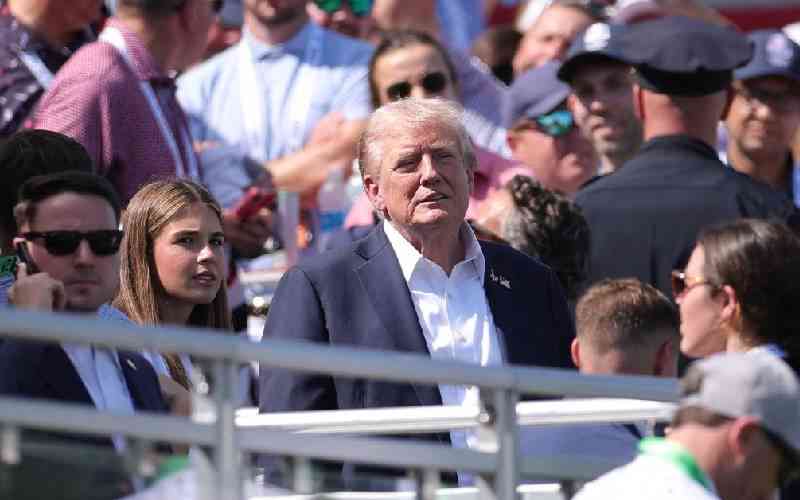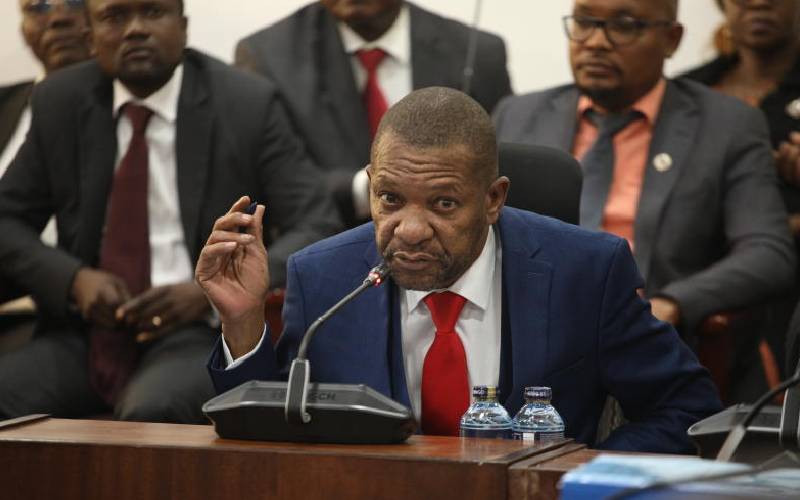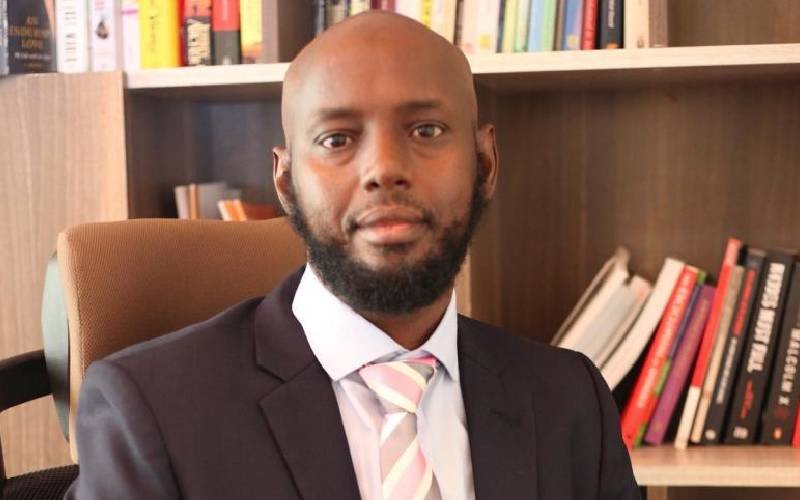
US President Donald Trump during the four-ball matches of the 2025 Ryder Cup at Black Course at Bethpage State Park Golf Course in Farmingdale, New York, on September 26, 2025. [AFP]
When US President Donald Trump stood to speak before the United Nations General Assembly (UNGA), he dismissed climate change as “the greatest con job ever perpetrated on the world.”
Trump ridiculed renewable energy, derided Europe’s green transition as “bankruptcy in disguise,” and championed fossil fuels as the only path to prosperity.
Trump’s words were not new. He has long mocked climate science. What was different this time was the global stage and the timing: at a moment when climate disasters are tearing through Africa, from deadly floods in Nigeria to historic drought in the Horn of Africa.
African leaders listened carefully. For them, this wasn’t just another speech from Washington. It was a reminder of how the most powerful nation continues to undermine global climate action, even as the Global South pays the heaviest price.
Kenya’s President William Ruto, speaking days earlier at the Africa Climate Summit in Addis Ababa, put it bluntly:
“Africa is not here to beg. We are here to demand. Those who polluted the most must pay the most.”Trump’s dismissal of climate change struck at the heart of that demand.
- Foot fetish: Simple guide to winning the battle against foot odour
- Senator Karanja raises concern over healthcare crisis in Nakuru
- Powerless: The irony of power outage at Africa energy summit
Keep Reading
Trump mocked Europe for losing “175,000 people to heat deaths each year” because energy costs are high and air conditioners remain unaffordable.
He pointed at America’s “clean, beautiful coal” as the answer.
But in Africa, the crisis is different. Communities are losing lives not to expensive air conditioners but to climate extremes made worse by emissions from Trump’s “beautiful coal.”
Cyclone Idai in Mozambique and Zimbabwe killed more than 1,200 people in 2019.
Drought in the Horn of Africa has left over 23 million people food insecure, according to the UN. In Kenya, farmers face unpredictable rains that wipe out harvests. These are not “con jobs.” They are daily realities.
President Ruto, again in Addis, said: “We contribute less than 4 per cent of global emissions, yet we face the harshest brunt. The injustice is glaring, and history will not forgive foot-dragging.”
Mohamed Adow, the director of Power Shift Africa, offered a sharp response. In his analysis, Adow argued that Trump was wrong about the science but right about the scam.
“The con is not in the science but in the response, a smoke-and-mirrors show run by the Global North at the expense of the Global South,”,” Adow said.
He pointed to carbon markets, which allow rich countries to keep polluting while outsourcing responsibility to African communities.
“This is green-tinged colonialism. The North keeps burning fossil fuels. The South keeps the forests. But who pays? Africa,” Adow warned.
Trump mocked the Paris Agreement as a “scam” where the US was asked to pay trillions while China and Russia paid little.
“That is why I withdrew from the fake Paris Climate Accord,” he said.
But what he left unsaid was more telling. The $100 billion a year pledged by rich nations to the Global South remains largely unpaid. The little that has arrived often comes as loans, worsening Africans’ debt burden.
Ghana, Zambia, and Kenya spend more on debt servicing than on climate adaptation. In 2023 alone, Africa paid over $70 billion in debt repayments, money that could have financed renewable energy and resilience.
“Loans are not climate finance. They are shackles. What we need is justice, not charity,” Ugandan activist Vanessa Nakate has repeatedly said.
Trump accused the UN of failing on climate, claiming its officials had predicted “entire nations would be wiped off the map by 2000,” which, he said, never happened.
Yet, African presidents argue it is precisely inaction from rich nations that now puts their countries at risk.
The African presidents say it is not science that threatens them, but inaction from the world’s biggest polluters.
Ghana’s Nana Akufo-Addo argued that Africa’s challenge is not ambition but resources. He said the continent is told to keep oil in the ground even as Europe quietly reopens coal plants.
“Africa’s problem is not lack of ambition. It is lack of means,” he noted.
Tanzania’s President Samia Suluhu Hassan noted the toll of climate disasters on her people. She noted that her country faces floods, droughts, and cyclones year after year.
What Africa needs, she said, is not lectures dismissing climate science but finance that can help communities adapt.
“We do not need lectures on fake science. We need real finance for adaptation,” she said.
President Ruto was more forceful. He told rich nations that their time for empty talk has passed.
In his words, the era of lip service is over. Ruto insisted that those most responsible for global emissions must take responsibility. Polluters, he said, must phase out fossil fuels and pay up for the damagee already done.
The frustration of African leaders contrasts sharply with Trump’s framing of climate action as “political correctness” destroying economies.
Mohamed Adow described what he called the climate cons that Africans live with every day.
He pointed to carbon markets that remove communities from their land while allowing polluters in the North to keep burning fossil fuels.
He also explained that the green technology supply chain, where the cobalt for electric car batteries emanates, often comes from Congolese mines worked by children.
Finance, he argued, has become another scam. The long-promised billions in climate aid rarely arrive as grants. Instead, they come as loans that trap poor nations in deeper debt.
Adow also took aim at the endless announcements of “net zero” goals, calling them promises timed for distant decades when today’s leaders will no longer be in power. To him, these pledges amount to delay rather than real action.
He criticized the cycle of desist tourism. Each time floods, droughts, or cyclones devastate communities, Western leaders and celebrities arrive for photo opportunities and charity appeals.
These gestures, Adow said, replace justice with pity and fail to address the structural causes of Africa’s vulnerability.
So when Trump says climate change is a con, African experts agree, but for very different reasons.
“The scam is how the North has turned planetary survival into another racket,” Adow said.
Trump’s rallying cry “Drill, baby, drill” was met with applause from oil lobbies, but alarm in Africa.
Africa has 60 per cent of the world’s best solar resources, yet receives just 2 per cent of global clean energy investment.
For leaders like Ruto, the choice is clear: leapfrog into renewables, not lock into fossil fuels.
At the Addis summit, Ruto said: “Renewables are Africa’s gift to the world. With the right investment, we can power our continent and export clean energy to others.”
Trump’s dismissal of wind and solar as “pathetic” technologies puts the US at odds with Africa’s vision.
Some may argue Trump’s speech is just rhetoric. But words from the US President shape global finance, trade, and diplomacy.
When he mocks climate science, it emboldens fossil fuel companies pushing new projects in Africa, from Uganda’s East African Crude Oil Pipeline (EACOP) pipeline to gas exploration in Mozambique.
When he derides renewables, it risks slowing the flow of green finance that African nations desperately need.
And when he paints climate action as a scam, it provides cover for those in the North who want to delay paying their fair share.
Africa is at a crossroads. On one path lies dependence on fossil fuels, debt, and broken promises.
On the other lies a renewable-powered future that creates jobs, cuts emissions, and protects communities.
Trump’s speech tried to drag the world down the first path. African leaders, however, are pushing hard for the second.
“We cannot be trapped by the false choice between development and decarbonisation. We can, and must, pursue both,” Ruto said.
Trump called climate change the greatest con job. He was wrong about the science. But African experts like Mohamed Adow warn that the real con lies in how the response has been hijacked, through carbon markets, fake finance, and empty pledges.
For Africa, costs are heavier. Millions face floods, droughts, and hunger. Billions in potential investment hang in the balance.
The Pan-African Climate Justice Alliance swiftly denounced Trump’s remarks at the UN, calling them “scientifically false and morally indefensible”.
They argued that Trump’s framing obscures the real danger facing African nations: the catastrophic impacts of climate change already underway.
At the Africa Climate Summit in Ethiopia, leaders pressed the point that climate finance is not charity but a legal duty.
They insisted that providing funds for adaptation and mitigation is anchored in commitments under the UN Framework Convention and the Paris Agreement.
One summit statement criticised developed nations for failing to honour their pledges, saying that such failure undermines trust and stalls progress.
Ethiopia’s Prime Minister Abiy Ahmed declared that “Africa did not cause this crisis, yet Africa can lead in solving it.”
He insisted that African nations already possess the solutions and now must act with clarity and unity.
On the negotiation front, Kenyas Envoy for climate Change Ali Mohamed has been vocal. He emphasised that despite the US. withdrawal from climate partnerships, private investment in renewable energy across Africa continues to grow.
Leaders and experts are shifting the narrative: from dependency and appeals to pity, to agency, rights, and alliances built on justice.
 The Standard Group Plc is a multi-media organization with investments in media
platforms spanning newspaper print
operations, television, radio broadcasting, digital and online services. The
Standard Group is recognized as a
leading multi-media house in Kenya with a key influence in matters of national
and international interest.
The Standard Group Plc is a multi-media organization with investments in media
platforms spanning newspaper print
operations, television, radio broadcasting, digital and online services. The
Standard Group is recognized as a
leading multi-media house in Kenya with a key influence in matters of national
and international interest.











